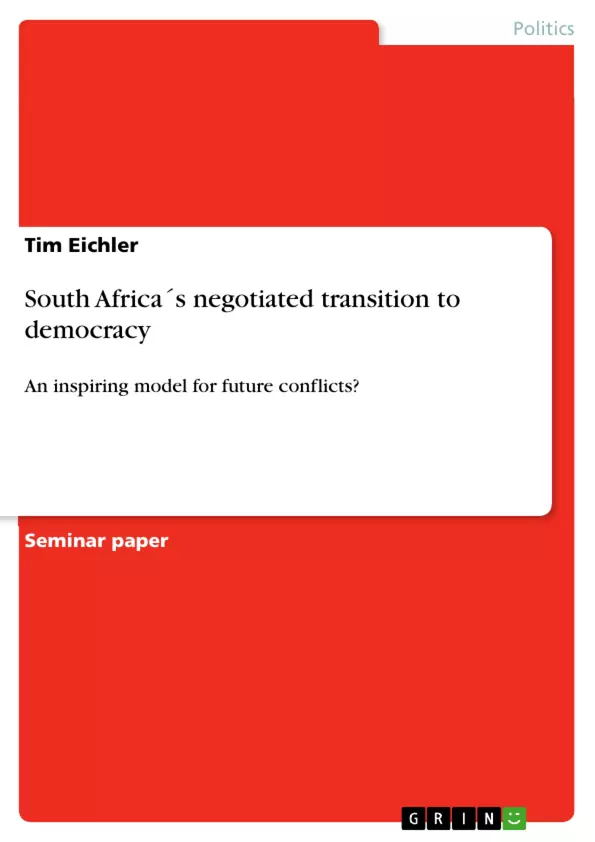In the twentieth century South Africa was characterized by a doctrine of racial and ethnic segregation. Starting with the electoral victory of the National Party in 1948 under slogan of apartheid the white supremacy enhanced vastly. To pass laws, which suppressed and neglected the coloured people, the politico-philosophical ideology of the South African Apartheid system was enforced with brutality (Deegan, 2001:23-25). This political attitude led to pure spite and violent attacks among racial groupings.
The apartheid, and especially the violence between races, was at its height during 1960, when 67 demonstrators were killed by the police at the Sharpeville Massacre, and 1976, when the Revolt in Soweto took place (Butler, 2009:10-11). During 1984 and 1988, more than 4000 black South Africans died due to political reasons. In 1990, President FW de Klerk announced a turning point in the struggle for democracy. Releasing Nelson Mandela and other political prisoners and lifting the ban on the anti-apartheid organizations opened the door to negotiations. In April 1994, the first democratic elections were held in South Africa and it ended in ushered in a new era of reconciliation and restitution (Boaduo, 2012:954).
South Africa’s way from apartheid to a non-racial democracy has attracted a lot of attention of the international audiences. The carefully arranged ‘transition to democracy’ with its negotiation and reconciliation can be regarded as one of the miracles in the twentieth century. It may be served as an inspiring model how to peacefully approach with a seemingly unsolvable political conflict. The question that is thus posed is: what factors played an important role in making sure that the transitions from apartheid to a non-racial democracy ended up peacefully in negotiations and not in a civil war?
Inhaltsverzeichnis (Table of Contents)
- 1 Introduction and background
- 2 Important steps of South Africa's negotiated transition to democracy
- 3 Impact of main factors and key players
- 4 Reasons for a peaceful transition
- 5 Conclusion
Zielsetzung und Themenschwerpunkte (Objectives and Key Themes)
This essay analyzes the complex process of South Africa's transition from apartheid to a non-racial democracy, examining the key steps, influential factors, and key players involved. It aims to assess whether this negotiated transition can be considered an inspiring model for resolving future conflicts.
- The historical context and evolution of apartheid in South Africa
- The crucial stages and key events in the transition to democracy
- The influence of domestic and international factors on the transition process
- The significance of key players like Nelson Mandela and FW de Klerk
- The potential of the South African model for future conflict resolution
Zusammenfassung der Kapitel (Chapter Summaries)
Chapter 1: Introduction and Background This chapter sets the historical context for South Africa's transition to democracy, outlining the origins and evolution of apartheid. It highlights the system's brutality and the widespread violence it engendered, focusing on key events like the Sharpeville Massacre and the Soweto Revolt. The chapter concludes by introducing the question of whether South Africa's transition can serve as a model for resolving future conflicts.
Chapter 2: Important Steps of South Africa's Negotiated Transition to Democracy This chapter delves into the key steps of South Africa's transition process, outlining three distinct phases: the initial phase (1978-1989), the crucial phase (1989-1991), and the maturity phase (1991-1994). It discusses the role of key figures like Botha and De Klerk, the importance of negotiations and compromises, and the establishment of the Convention for a Democratic South Africa (CODESA). The chapter emphasizes the significance of the release of Nelson Mandela and the peaceful transfer of power to a new regime.
Chapter 3: Impact of Main Factors and Key Players This chapter examines the main factors that facilitated South Africa's transition to democracy, analyzing both external and internal influences. It highlights the impact of the collapse of the Soviet Union, the independence of neighboring countries, and international pressure from organizations like the United Nations. The chapter also explores the crucial role of domestic factors, including the liberation movement, mass protests, and the armed struggle. It concludes by acknowledging the complex interplay of these factors in driving the transition process.
Schlüsselwörter (Keywords)
South Africa, apartheid, transition to democracy, negotiated settlement, conflict resolution, Nelson Mandela, FW de Klerk, liberation movement, international pressure, domestic factors, key players, peaceful transfer of power, reconciliation, restitution.
- Arbeit zitieren
- Tim Eichler (Autor:in), 2014, South Africa´s negotiated transition to democracy, München, GRIN Verlag, https://www.grin.com/document/286989



